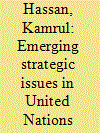| Srl | Item |
| 1 |
ID:
148556


|
|
|
|
|
| Summary/Abstract |
United Nations (UN) peacekeeping activities have seen an exponential growth in both size and scope since their inception in mid-1950s. These operations are now seen as the core activity of the international community’s effort to establish peace in conflict-torn countries around the world. Operational environment and nature of threats in the UN Peacekeeping Operations (PKOs) area are continuously changing. UN also had to evolve and adopt new strategies to cope up with the operational environment. Changes in the operational strategy of UN are a continuous process. Troops Contributing Countries (TCCs) need to remain fully abreast with the strategies of UN to prepare their armed forces accordingly. The landmark Brahimi Report has manifested a renewed vision for UNPKOs to make them more effective and comparatively cost-efficient. It includes several important recommendations for enhancing capacity and effectiveness of UNPKOs. UN has already implemented some reforms according to the recommendations of the report in various areas of PKOs such as peacekeeping policy and strategy, structure of peacekeeping department, conduct and discipline etc. The reform agendas and other evolving strategic issues demand in-depth analysis by TCCs. This paper highlights important evolving strategies of UNPKOs along with an analysis to reveal their implications to the Bangladesh Armed Forces. Apparently, it is felt that Bangladesh Armed Forces may struggle to continue its current share in troops contribution if appropriate measures are not taken to face foreseeable challenges. The paper also recommends few measures which may help Bangladesh Armed Forces take benefits of the opportunities and minimise effects of the perceived challenges resulting from the evolving strategies.
|
|
|
|
|
|
|
|
|
|
|
|
|
|
|
|
| 2 |
ID:
133522


|
|
|
|
|
| Publication |
2014.
|
| Summary/Abstract |
The paper seeks to assess the growing strategic importance of the Bay of Bengal and how this signifies for Bangladesh's imperative to develop strong maritime capabilities. With the growing significance of the Bay of Bengal, both the littoral and the extra-littoral countries are reassessing their interests in this region and reformulating respective strategies to ensure optimum benefit in their favour. After the verdict by the International Tribunal for the Law of the Sea (ITLOS) in March 2012, Bangladesh is now able to establish its claim over a significant area in the Bay of Bengal. These emerging realities are driving Bangladesh to develop capabilities to project effective control over its maritime zone and to ensure sustainable utilisation of marine resources. To respond efficiently, Bangladesh government has undertaken various initiatives including modernisation of the Bangladesh Navy with an aim of establishing a three dimensional force. The paper, based on secondary literature, finds that there is a growing interest among the countries in the Bay of Bengal area leading to a competitive strategic atmosphere for countries like Bangladesh. The findings also suggest that Bangladesh's drive for maritime capability building is a timely and pragmatic step which requires further strengthening in the coming years. Besides, the paper also argues that Bangladesh needs to formulate a comprehensive maritime strategy, focusing on diverse sectors of capability building. Some key areas can include empowering the coast guard, resource exploration and exploitation capacities, maritime infrastructure development for connectivity and seaborne trade as well as well-coordinated maritime governance.
|
|
|
|
|
|
|
|
|
|
|
|
|
|
|
|